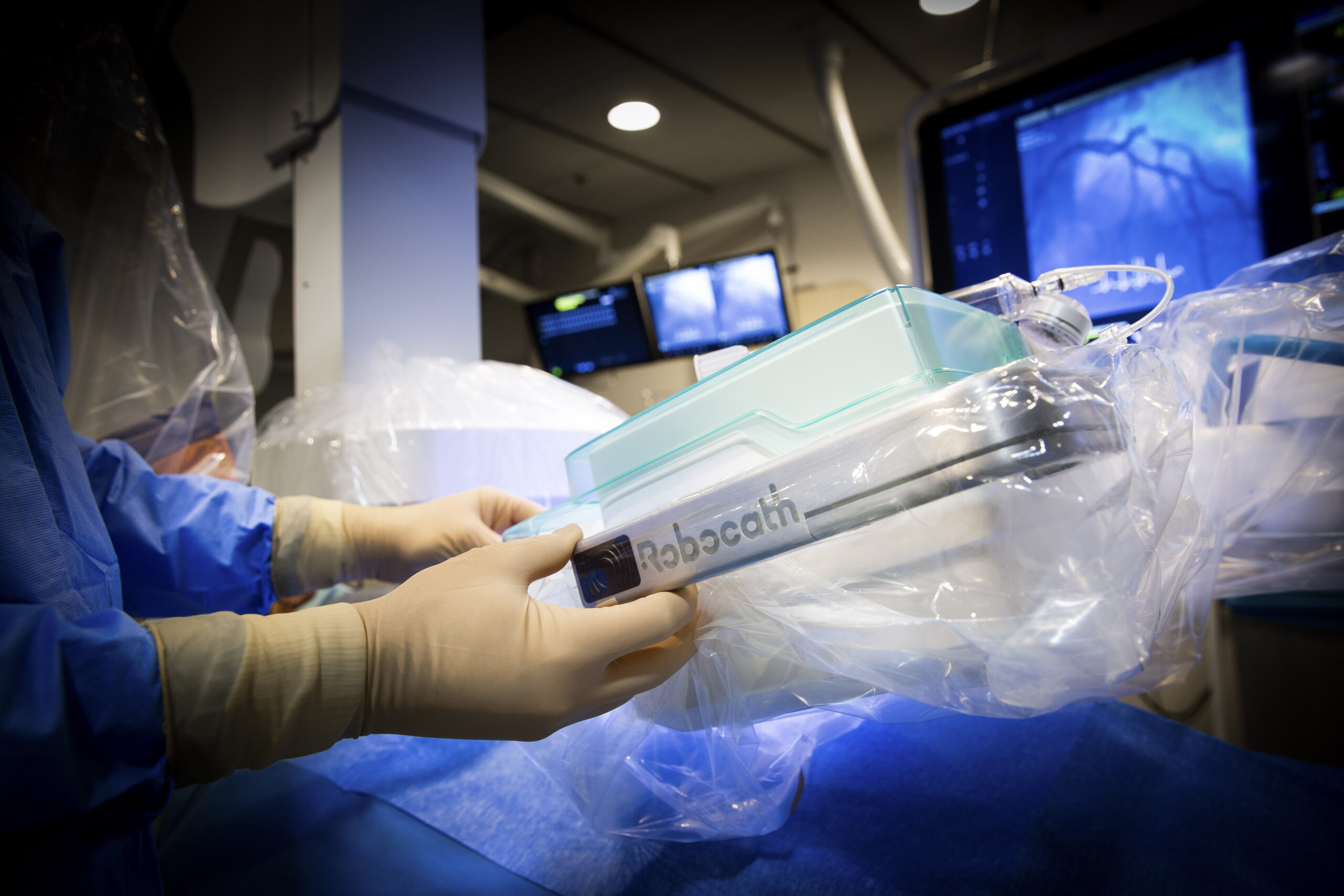Share this post:

Rouen, France, May 15, 2024 – Robocath, a company that designs, develops and markets innovative robotic solutions to treat cardiovascular and neurovascular diseases, today announces the publication of a new report into current and future expectations for the use of robotics in interventional medicine.
The report sets out the findings from an independent study conducted by Suazio Consulting. It involved 30 interventional cardiologists based in the US, Europe and Asia.
The study reveals growing support for the use of robotics within the interventional medicine community. 87% of those surveyed now believe that robotics has the potential to improve the quality of treatment and/or achieve more consistent outcomes – up from just 61% in the previous survey, conducted in 2019.
The survey also shows that despite certain technical limitations, today there is real interest in the routine use of vascular robotic solutions, with 77% of respondents confirming that they have already considered the option. When asked about the wider potential clinical applications of this technology, i.e. to treat all kinds of coronary lesions, 90% of respondents said that they would consider introducing robotics into their daily practice. Moreover, when asked to describe their vision for the future of their activity, more than half of the interventional cardiologists questioned referred to vascular robotics.
Survey participants reference both the practical advantages of using robotics (precision and protection from radiation) and the training benefits that robotics could offer as part of the digitalization of the cathlab of the future (remote procedures and use of AI). 67% of those questioned believe that robotics will open up new treatment approaches for cardiovascular diseases. Among those who already use the technology, this figure rises to 100%.
The study provides an opportunity to assess current levels of concern around radiation exposure, ten years after the SCAI survey on this topic. Despite the wide range of radioprotection equipment on the market and the advances in imaging systems, 67% of respondents still have serious concerns about daily exposure to radiation. Three out of ten also report having musculoskeletal problems.
Click here to see the full report
“The aim of this survey is to understand user needs and assess their levels of interest in robotic solutions based on their current knowledge and expectations for the future. All the results reaffirm our development ambitions and we are excited to be sharing the data with the interventional medicine community at EuroPCR 2024. The findings confirm the strategic decisions that we have made in recent years. First, we garnered support for the development of vascular robotics by demonstrating the safety and efficacy of this novel approach; we will now expand the technical possibilities and the clinical applications of this technology. Currently under development, our next generation robotic platform will be capable of treating more complex coronary angioplasties, as well as performing peripheral and neurovascular interventions, including the treatment of strokes. The findings of this survey spur us on to continue to pursue the core ambition of our business, putting robotics at the heart of the cathlab transformation. In the coming years, robotics will gradually incorporate new components with real added value, such as AI and remote treatment capabilities, and in doing so will open up universal access to the best possible care regardless of geographical location,” explained Lucien Goffart, CEO of Robocath.
ABOUT SUAZIO
SUAZIO, part of NAMSA, is a research and consultancy agency that provides far-reaching customer insights for products and services in Medtech markets. SUAZIO with NAMSA provides global end-to-end partnership from concept to commercialization.
ABOUT ROBOCATH
Founded in 2009 by Philippe Bencteux, MD, Robocath designs, develops and markets smart robotic solutions to treat cardiovascular and neurovascular diseases. As an active player in the digital evolution of the medical industry, its smart connected solutions aim to enhance hand gestures and make medical procedures safer.
Robocath develops robotic solutions which integrate a unique bionic technology that optimizes the safety of robotic-assisted coronary angioplasty. This medical procedure consists of revascularizing the cardiac muscle by inserting one or more implants (stents) into the arteries that supply it with blood. Every 30 seconds, somewhere in the world, this type of procedure is performed. Robocath’s robotic solutions are designed to operate with precision and perform accurate movements, creating better interventional conditions. Thanks to their open architecture, they are all compatible with market-leading devices and cathlabs.
In 2019, the company received the CE marking for R-OneTM, its first robotic solution. In a prospective, multicenter, non-randomized, single-arm clinical trial, R-One demonstrated safety and efficacy as it achieved more than 95% technical procedure success with no MACE (major adverse cardiovascular events). Currently R-One is used in Europe, Africa and China.
By pursuing the development of smart digital solutions, Robocath aims to become a world leader in vascular robotics. Its ambition is to guarantee equal access to treatment for vascular emergencies through the development of remote interventions, offering the best care for all. Based in Rouen, France, Robocath has more than 70 employees.
To download documents, you can right-click on the links above and chose « Save link as… »




